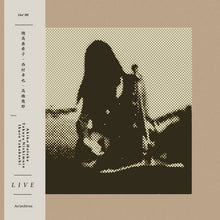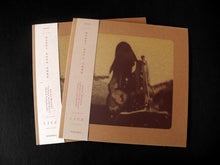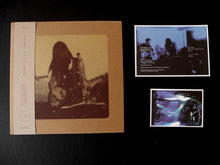An'archives / France / 2021
An’archives are proud to present a reissue of the self-titled first album by the trio of Akiko Hotaka, Takuya Nishimura and Ikuro Takahashi. Originally released in 2020 as a limited CD-R on the Uramado label, those who had the chance to hear this collection of live recordings, documenting a brief window of exploratory activity for Hotaka during the mid-2010s, were knocked out by its elemental force, Hotaka’s minimal, carefully sculpted pop songs spirited away to other planes of where by Nishimura and Takahashi’s improvisatory tactics, with Hotaka’s guitar now tender, now furiously overloaded.
Hotaka first came to attention as a member of Tori Kudo’s Maher Shalal Hash Baz. She’s been playing and recording her own songs for almost two decades now, though, releasing a string of CD-Rs across the 2000s that documented live performances at Enban, some with Masanori Hattori and Yuki Yoshida; this trio subsequently released several lovely folk-like albums on F.M.N. Sound Factory. More recently, Hotaka has formed a new trio, Hotarutachi, with Shohei Matsuo and Kenji Yoshikawa (their debut album, Hikari, was released by Hayabusa Landings in 2018). Playing with Nishimura and Takahashi, though, freed Hotaka’s playing immensely. There was always something expansive about her approach to the song, but this freedom was implicit in earlier music; on this album, which draws from performances undertaken across 2015 and 2016 at Hikari No Uma, Okubo, Hotaka wrings great intensities from the simplest of two-chord levitations, allowing her melodies to follow lines of deeply personal logic. There are still skeletal pop songs here, but with Nishimura and Takahashi as Hotaka’s backing group, there’s something very open about the music; it’s wild yet courteous, gallant yet refined. Throughout, both Nishimura and Takahashi draw on the double-language they’ve developed over the years, through performing in groups who are dedicated to the wide open spaces between song form and freedom – Nishimura has played with Ché-SHIZU, Miminokoto and Suishou No Fune, among others; Takahashi’s history is deeper still, with time spent with Ché-SHIZU, Maher Shalal Hash Baz, LSD March, Kousokuya, Nagisa Ni Te, High Rise, and Keiji Haino’s Fushitsusha and Aihiyo, and on. They are ideal foils for the slow breathing, simply structured songs that Hotaka writes, sourcing great depth of feeling from the most fundamental of gestures.








